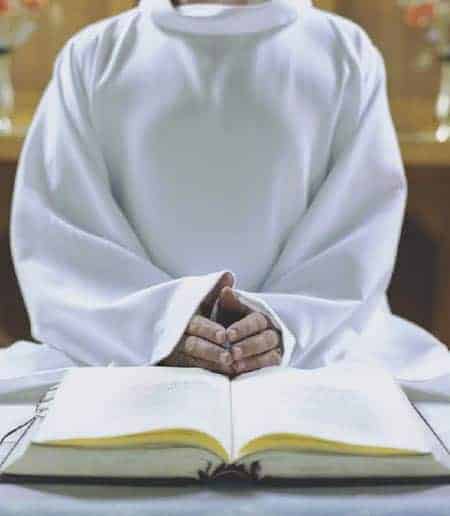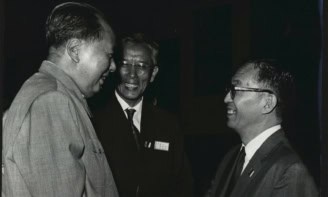Scientists and those people with religious convictions may have sharply contrasting beliefs, says Robert P Crease, but does that forbid them from having stimulating conversation?

I used to host family dinners at which the guests included my uncle Eugene, who was a Marxist, and my great-aunt Debbie, an ardent anti-Communist. Debbie and Eugene were interesting people for different reasons. However, they knew that their beliefs were incompatible, and so they avoided each other in public.
One Thanksgiving, it finally happened — Debbie and Eugene exchanged words! The rest of us froze, hoping to overhear every penetrating remark, sure that sparks would fly. It was the biggest let-down in family history. The two politely discussed a local road-construction project — safe territory. It wasn’t worth the eavesdropping.
I remember that dinner whenever I hear of encounters between science and religion. The battle lines in what is usually cast as a clash of beliefs are clearly drawn on one side by books like Christopher Hitchins’ diatribe God Is Not Great: How Religion Poisons Everything, and Richard Dawkins’ The God Delusion, and on the other side by Christian fundamentalists who dismiss evolution, and by some Buddhists who see science — as the Dalai Lama remarks, regrettably, in his eyes — as a “killer of religion”. In such an atmosphere, encounters are generally uninformative battles or polite and inconsequential exchanges. Is stimulating conversation at all possible?
Belief versus trust
I think it is. The trouble with the way that most such encounters are framed, strange as it may sound, is that neither science nor religion is ultimately about beliefs. If they were, they would be as insubstantial as the houses in the Monty Python sketch in which the buildings, held up by the beliefs of the occupants, crumble when those beliefs wavered. Science and religion stand on thicker ground than that. Each involves its practitioners in a powerful network of ties to the world, though any particular tie can be replaced or modified. The name for these bonds — a name applicable both to specific ties and to the network itself — is trust.
Much human experience — from having relationships, hiring nannies and electing politicians to mailing letters, boarding aircraft, playing with toys and eating food — depends on trust. But trust is particularly important to both scientists and to the religious, whether ordinary churchgoers or theologians. Both groups have to exercise trust — that is defer to others about something beyond one’s immediate knowledge — in a set of specific things.
For scientists, these things include knowing which data, theories and findings to credit; for the religious, it includes knowing which leaders, rituals and prophets’ words to honour. Such trust must be exercised carefully and reflectively, not indiscriminately; those who blindly follow the orders of leaders are not acting religiously but fanatically. And trust is always open to re-evaluation.
But both groups also have to trust something more intangible: the scientific life and the religious life, respectively. For at the core, if sometimes not the surface, of science and religion is a kind of humility. For scientists, it is the awareness that we do not know enough about the natural world; we know only fragments, and not all that we can. For the religious — and especially for Christians, Jews and Muslims — the humility lies in the awareness that the way we humans ordinarily lead our lives is imperfect; that we are not all that we can be. The idea that the truly religious life is marked by humility and the awareness of one’s own ignorance is hardly controversial, and is the thesis of the New York University theologian James P Carse’s new book The Religious Case Against Belief.
Responding to humility
Scientists react to this humility by engaging in scientific inquiry; the moment one ceases to think such inquiry is the proper route to answering even the most intractable puzzle about the natural world, and instead invokes a supernatural cause, one ceases to be a scientist. The religious respond to humility by living a spiritual life, in viewing one’s life as a response to a call rather than as a career or a life of blind obedience. (Both kinds of humility can overlap in the same person.)
Thus trust plays a two-fold role in both science and religion. It is placed both in a set of tangible things (“ontic” things, philosophers say) and in a more intangible (“ontological”) way of life. The tangible things help shape the way of life, but in living that life (conducting research, living spiritually) trust in specific tangible things can be gained, lost and regained.
Many differences exist between the way that this two-fold interaction plays out in science and religion. In science, the process is collective and public, with consensually agreed upon concepts and evidence, while in religion it is personal. Scientists tend to be interested in the objects of trust — in what makes for trustworthy theories, techniques and data. Religious authors tend to be more concerned with first-person experiences of trusting and betrayal. They are more conscious that trusting is not something we choose but is forced on us from birth.
Scientific and religious organizations are periodically shaken by controversies involving trust. Scientific institutions are sometimes found to have covered up unsafe practices or allowed fraud, while allegations of sexual abuse by priests have undermined trust in religious institutions. Finally, both scientists and the religious have encountered those who deliberately seek to disrupt trust — politicians, for instance, who cultivate controversy about global-warming data in order to be able to ignore it.
The critical point
Trust, then, is one issue about which both scientists and the religious have a backlog of experiences that might be mutually illuminating. It would be interesting to see what would happen if we got them talking, not about their beliefs, but about how they form and defend those beliefs. That would be a conversation worth overhearing.
• This column is adapted from an article that appeared in Newsday on 1 July 2007



